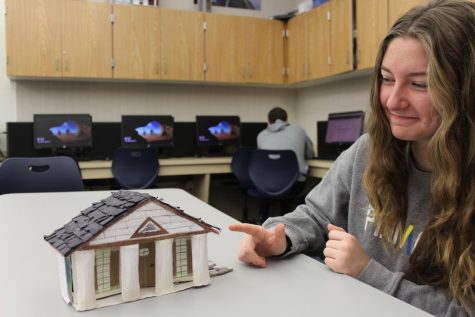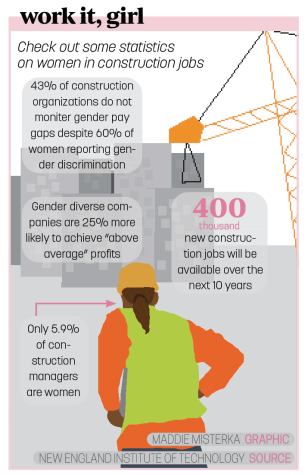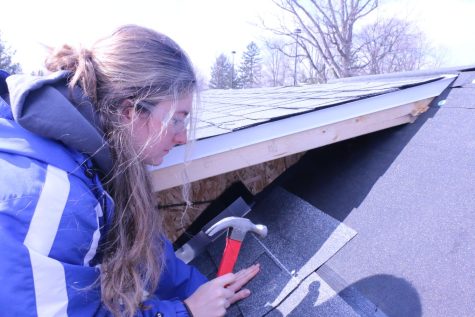Senior Sophia Hanna climbs a ladder to work on the roof of the “Tiny Home,” a house that will have running water, electricity and gas when it is completed. Hanna is one of two girls out of the 27 students in her class.
“At first, I didn’t know that advanced construction trades was a class that was offered here. So when I heard about it, I was like, ‘Oh my gosh, I want to be in that class and maybe pursue a career in Construction Management (CMT),’” Hanna said. “And then I toured the Purdue Polytechnic (Institute) and I was the only girl. I was sitting there and I was like, ‘This is all boys. Is this how my classes are going to be for the next four years?’”
Hanna’s experience isn’t an anomaly. According to the Bureau of Labor Statistics, 8.4% of construction managers were women in 2017. Advanced construction trades teacher Larry Griggs said 14% of students in construction at this school are women.
“I’d say the (number of female students) has gotten better but it’s not good. I mean, two out of 27, that’s not good. We need to have more females represented in the construction industry,” Griggs said.

For Tejasvi Tadikonda, automotive student and sophomore, she said she doubted her abilities and felt a need to prove herself as a female in the automotive class.
“It was very intimidating to be in a predominately-male class because I felt like I had to prove my worth when there was nothing I really had to prove to them,” Tadikonda said. “People always talk about their female hero stories like, ‘Yeah, I did this and there were a lot of male people there and everyone looked up to me’ and it really does not feel like that at all.”
Hanna said while she also feels a need to prove herself as a woman in construction, she said everyone has to prove themselves.
“Right when I joined the class, I had a lot of boys try to take things out of my hands or tell me how to do something even though I already knew how to do it,” Hanna said. “But I think regardless of gender or race, you need to prove yourself either way.”
As a female assistant professor of CMT at Purdue University, Luciana Debs said her students often doubt her expertise.
“On our evaluations, I believe they evaluate women and male professors very differently. (The bias) becomes very clear on the evaluations and the ratings, and there’s research about it showing that it’s usually lower for us,” Debs said. “Sometimes, they don’t think I have as much experience as some male faculty when it’s just about the same.”
For example, according to a study led by Lillian MacNell, researcher at North Carolina State University, students rated male instructors significantly higher than female instructors for professionalism, fairness, and promptness. When a male and female instructor posted grades two days after a test, students rated the male instructor a 4.35 out of 5 for promptness while the female instructor received a 3.55 out of 5.
Tadikonda said she thinks women tend to be looked down upon due to society’s portrayal that women are not as strong as men.
“I get that, biologically, women aren’t as strong as men. But to take apart a simple bolt or unscrew a simple thing—we can do that. Whenever I had trouble unscrewing a bolt or something, immediately a guy would just take it over for me rather than letting me try it on my own,” she said.
With advancements in technology, Griggs said construction jobs have become less physically demanding.
“There are very tough jobs in construction. There are a lot of boys that couldn’t handle it. There are a lot of girls who would not be able to handle the physical part of it but there are a lot that can,” Griggs said. “One thing that I see happening now is that we have more equipment to make it easier for anybody to use heavy equipment.”

Regardless, Debs said people view construction management as a conflict between strength and femininity for women.
She said, “(Many people think) you can’t be a girly-girl and still work in construction, and that’s farther from the truth. But if you show that you’re fragile or paint your nails, people won’t take you as seriously. (People think) the woman who works in construction is less of a woman, which is something we’re trying to break and show that you can be just as good of a construction manager.”
In fact, Griggs said his best students have typically been female students.
“Sometimes, we get boys into the construction field who think they know everything about construction whereas a lady may come in and not know as much, but they spend more time learning how to do things the correct way.”
Tadikonda said she agreed and said women tend to undermine their abilities. She said more people, female and male, should take automotive classes.
“(Girls) think (automotive class is) too hard but it’s really not. And I think everyone should have basic automotive knowledge. It’s appalling how many people want a car but don’t want to know anything about a car,” she said.
Likewise, Hanna said more female students should take construction classes and consider CMT as a possible career.
“We will always be living in buildings and all of that, and I think you need both a man’s view and a woman’s view in order for things to function properly and to make changes that will be the most beneficial for us,” Hanna said.
Debs said not only do females have a lot to offer to the construction industry, but pursuing CMT also benefits female students.
“I think people don’t emphasize enough about how construction allows you to learn about other people; you meet owners, engineers and you have to talk to the site workers,” Debs said. “We think about it from a technological side but it’s really about the people.”
Griggs said knowledge obtained from construction classes is useful even for those who do not want a career in construction.

“If not going into the area of construction in college or trade school, just for personal home ownership, being able to use the tools and equipment we use in construction is very valuable for everybody,” he said.
Ultimately, in light of Women in Construction Week, which took place March 6 through March 12, Griggs said society should break the gender stereotypes surrounding women in construction and automotive industries.
“For a girl to take construction, they get seen differently,” Griggs said. “If you think about it, your wife is going to come home and she’s going to have dirty clothes and cuts on her hands and her hair is going to be all sweaty and stuff. That’s not a look that some people perceive (of women) and that’s the thing that we have to break. It is okay for anybody who’s capable of doing (construction) to do it if they want to.”


































![British royalty are American celebrities [opinion]](https://hilite.org/wp-content/uploads/2024/03/Screenshot-2024-03-24-1.44.57-PM.png)


















![Review: “Suits” is a perfect blend of legal drama and humor [MUSE]](https://hilite.org/wp-content/uploads/2024/04/unnamed-1.png)
![Chelsea Meng on her instagram-run bracelet shop [Biz Buzz]](https://hilite.org/wp-content/uploads/2024/04/IMG_2446-1200x838.jpg)
![Review: Quiet on Set: The Dark Side of Kids TV is the long awaited exposé of pedophilia within the children’s entertainment industry [MUSE]](https://hilite.org/wp-content/uploads/2024/04/unnamed.jpg)
![Review: “The Iron Claw” cannot get enough praise [MUSE]](https://hilite.org/wp-content/uploads/2024/04/unnamed.png)
![Review: “The Bear” sets an unbelievably high bar for future comedy shows [MUSE]](https://hilite.org/wp-content/uploads/2024/03/unnamed.png)
![Review in Print: Maripaz Villar brings a delightfully unique style to the world of WEBTOON [MUSE]](https://hilite.org/wp-content/uploads/2023/12/maripazcover-1200x960.jpg)
![Review: “The Sword of Kaigen” is a masterpiece [MUSE]](https://hilite.org/wp-content/uploads/2023/11/Screenshot-2023-11-26-201051.png)
![Review: Gateron Oil Kings, great linear switches, okay price [MUSE]](https://hilite.org/wp-content/uploads/2023/11/Screenshot-2023-11-26-200553.png)
![Review: “A Haunting in Venice” is a significant improvement from other Agatha Christie adaptations [MUSE]](https://hilite.org/wp-content/uploads/2023/11/e7ee2938a6d422669771bce6d8088521.jpg)
![Review: A Thanksgiving story from elementary school, still just as interesting [MUSE]](https://hilite.org/wp-content/uploads/2023/11/Screenshot-2023-11-26-195514-987x1200.png)
![Review: When I Fly Towards You, cute, uplifting youth drama [MUSE]](https://hilite.org/wp-content/uploads/2023/09/When-I-Fly-Towards-You-Chinese-drama.png)
![Postcards from Muse: Hawaii Travel Diary [MUSE]](https://hilite.org/wp-content/uploads/2023/09/My-project-1-1200x1200.jpg)
![Review: Ladybug & Cat Noir: The Movie, departure from original show [MUSE]](https://hilite.org/wp-content/uploads/2023/09/Ladybug__Cat_Noir_-_The_Movie_poster.jpg)
![Review in Print: Hidden Love is the cute, uplifting drama everyone needs [MUSE]](https://hilite.org/wp-content/uploads/2023/09/hiddenlovecover-e1693597208225-1030x1200.png)
![Review in Print: Heartstopper is the heartwarming queer romance we all need [MUSE]](https://hilite.org/wp-content/uploads/2023/08/museheartstoppercover-1200x654.png)






















![Review: Ladybug & Cat Noir: The Movie, departure from original show [MUSE]](https://hilite.org/wp-content/uploads/2023/09/Ladybug__Cat_Noir_-_The_Movie_poster-221x300.jpg)

![Review: Next in Fashion season two survives changes, becomes a valuable pop culture artifact [MUSE]](https://hilite.org/wp-content/uploads/2023/03/Screen-Shot-2023-03-09-at-11.05.05-AM-300x214.png)
![Review: Is The Stormlight Archive worth it? [MUSE]](https://hilite.org/wp-content/uploads/2023/10/unnamed-1-184x300.png)


